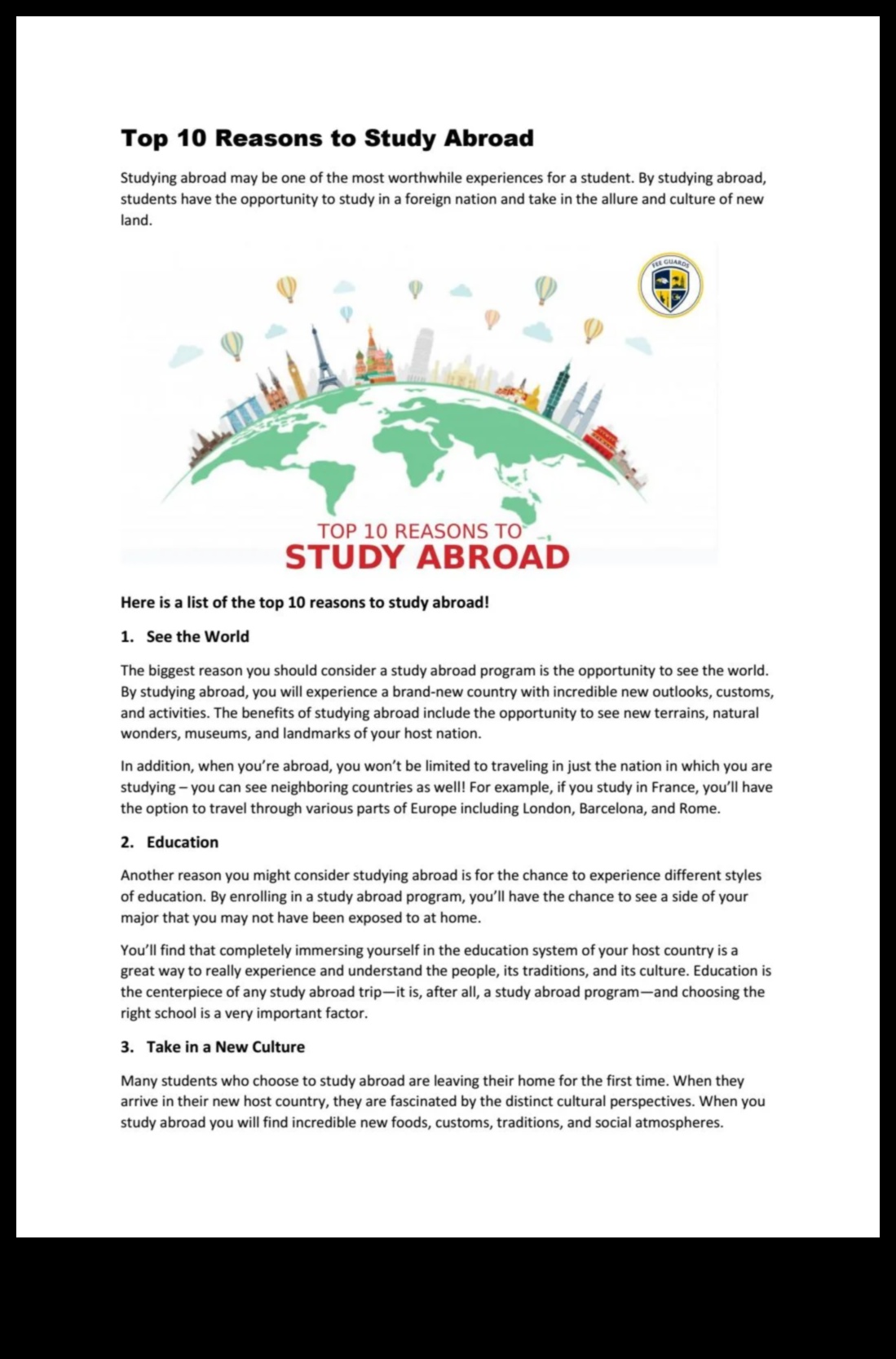
Benefits of Studying Abroad
Studying abroad is an amazing opportunity to learn about a new culture, meet new people, and challenge yourself in new ways. There are many benefits to studying abroad, both academically and personally.
Academic Reasons to Study Abroad
Studying abroad can give you a unique perspective on your academic studies. You will learn about different cultures, political systems, and ways of life. You will also be exposed to new ideas and perspectives, which can help you to become a more well-rounded student.
In addition, studying abroad can help you to improve your language skills. If you are studying in a country where English is not the native language, you will have the opportunity to practice your language skills in a real-world setting. This can be a great way to improve your fluency and pronunciation.
Cultural Reasons to Study Abroad
Studying abroad is a great way to learn about a new culture. You will have the opportunity to meet people from different backgrounds and learn about their customs and traditions. You will also get to experience different religions, cuisines, and art forms.
Studying abroad can help you to become more tolerant and understanding of other cultures. It can also help you to develop a global perspective on the world.
Social Reasons to Study Abroad
Studying abroad is a great way to meet new people from all over the world. You will be able to make friends from different cultures and backgrounds. These friendships can last a lifetime and can provide you with a support network wherever you go.
Studying abroad can also help you to develop your social skills. You will have to interact with people from different cultures and backgrounds, which can help you to become more confident and outgoing.
Financial Reasons to Study Abroad
Studying abroad can be a great way to save money on your education. Many universities and colleges offer scholarships and financial aid specifically for students who want to study abroad. You can also find ways to save money on your living expenses by living with a host family or sharing an apartment with other students.
Studying abroad can also give you a competitive edge in the job market. Employers are often looking for employees who have international experience. Studying abroad can show potential employers that you are open-minded, adaptable, and willing to learn new things.
Career Reasons to Study Abroad
Studying abroad can help you to develop your career skills. You will learn how to work independently and as part of a team. You will also learn how to adapt to new situations and overcome challenges.
Studying abroad can also help you to build your network of contacts. You will meet people from all over the world who can help you to find a job or internship after you graduate.
Personal Development Reasons to Study Abroad
Studying abroad can be a great way to grow as a person. You will learn to be more independent and self-reliant. You will also learn to cope with new challenges and overcome obstacles.
Studying abroad can also help you to develop your problem-solving skills and your ability to think critically. You will be exposed to new ideas and perspectives, which can help you to become more open-minded and flexible.
Language Learning Reasons to Study Abroad
Studying abroad is a great way to learn a new language. If you are studying in a country where English is not the native language, you will have the opportunity to practice your language skills in a real-world setting. This can be a great way to improve your fluency and pronunciation.
Studying abroad can also help you to learn about the culture of the country where you are studying. You will learn about the history, traditions, and customs of the people who live there.
Safety and Risks of Studying Abroad
Studying abroad can be a safe and rewarding experience, but it is important to be aware of the risks involved. Some of the risks associated with studying abroad include:
| Feature | Answer |
|---|---|
| Study Abroad | The act of studying at a school or university in a foreign country. |
| Benefits of Studying Abroad | There are many benefits to studying abroad, including academic, cultural, social, financial, career, personal development, and language learning reasons. |
| Reasons to Study Abroad | There are many reasons why people choose to study abroad, including to improve their academic skills, experience a new culture, meet new people, learn a new language, and gain a global perspective. |
| Cost of Studying Abroad | The cost of studying abroad can vary depending on the country, school, and program you choose. However, it is generally more expensive than studying at a school in your home country. |
| Scholarships for Studying Abroad | There are many scholarships available for students who want to study abroad. These scholarships can help you cover the cost of tuition, travel, and living expenses. |

II. Academic Reasons to Study Abroad
Studying abroad can provide students with a number of academic benefits, including:
- Exposure to different cultures and perspectives
- Improved language skills
- Increased critical thinking skills
- Enhanced global awareness
- Greater opportunities for research and collaboration
III. Academic Reasons to Study Abroad
There are many academic reasons to study abroad. For example, studying abroad can help you to:
- Develop your language skills
- Gain a global perspective
- Meet new people from different cultures
- Learn about different cultures
- Expand your horizons
- Challenge yourself
- Develop your independence
- Improve your critical thinking skills
- Prepare for a career in international business
If you are interested in pursuing a career in international business, studying abroad can be a great way to get started. By studying abroad, you will gain a global perspective and learn about different cultures. You will also develop your language skills and critical thinking skills. This will make you a more attractive candidate for jobs in international business.
In addition to the academic benefits, studying abroad can also be a lot of fun. You will have the opportunity to travel to new countries and meet new people. You will also learn about different cultures and ways of life. Studying abroad can be a life-changing experience that will benefit you both academically and personally.
II. Academic Reasons to Study Abroad
Studying abroad can provide you with a number of academic benefits, including:
- Exposure to a new culture and educational system
- Improved language skills
- Expanded worldview
- Increased critical thinking skills
- Opportunity to earn credits that can transfer back to your home institution
By studying abroad, you will have the opportunity to learn about a new culture and educational system from the inside out. You will be able to interact with people from different backgrounds and learn about their perspectives. This can help you to develop a more global understanding of the world.
In addition to learning about a new culture, studying abroad can also help you to improve your language skills. You will be immersed in a language environment where you will have the opportunity to practice your language skills every day. This can help you to become more fluent in a foreign language.
Studying abroad can also help you to develop a more expanded worldview. You will be exposed to new ideas and perspectives, which can help you to challenge your own beliefs and assumptions. This can lead to a more open-minded and tolerant outlook on life.
Finally, studying abroad can also help you to develop your critical thinking skills. You will be faced with new challenges and situations that will require you to think critically and solve problems. This can help you to become a more effective problem solver and decision maker.
If you are considering studying abroad, it is important to weigh the academic benefits of doing so against the costs and other factors involved. However, if you are looking for an opportunity to expand your horizons and grow as a person, studying abroad can be a very rewarding experience.

V. Financial Reasons to Study Abroad
There are many financial reasons to study abroad. For one, studying abroad can be a great way to save money on tuition. Many universities offer scholarships and financial aid specifically for students who want to study abroad. In addition, living costs can be lower in some countries than they are in the United States. For example, the cost of living in Europe is generally lower than the cost of living in the United States.
Another financial benefit of studying abroad is that it can help you develop your financial skills. When you study abroad, you’ll need to learn how to budget your money, how to manage your finances, and how to live on a limited budget. These are all valuable skills that will help you in your future career.
Finally, studying abroad can help you to build your credit history. When you study abroad, you’ll likely need to get a credit card or a loan in order to cover your expenses. This will help you to build your credit history and make it easier for you to get loans or credit cards in the future.

VI. Career Reasons to Study Abroad
Studying abroad can be a great way to boost your career prospects. Here are a few of the reasons why:
- You’ll gain international experience.
- You’ll learn about different cultures.
- You’ll develop new skills and perspectives.
- You’ll build your network.
- You’ll be more competitive in the job market.
In today’s globalized economy, employers are increasingly looking for employees with international experience. Studying abroad can give you the edge you need to stand out from the competition and land your dream job.
Here are some specific examples of how studying abroad can benefit your career:
- A study by the Association of American Colleges and Universities found that students who study abroad are more likely to get jobs that require international skills and knowledge.
- A survey by CareerBuilder found that 70% of employers believe that international experience is a valuable asset in the workplace.
- A study by the National Center for Education Statistics found that students who study abroad earn higher salaries than their peers who do not.
If you’re considering studying abroad, there are a number of things you can do to make sure you get the most out of the experience. Here are a few tips:
- Choose a program that is aligned with your career goals.
- Get involved in extracurricular activities that will help you develop your skills and network.
- Take advantage of all the opportunities that your program has to offer.
- Stay focused on your goals and make the most of your time abroad.
Studying abroad can be a life-changing experience that can benefit your career in many ways. If you’re ready to take your career to the next level, consider studying abroad.

VII. Personal Development Reasons to Study Abroad
Studying abroad can be a great way to develop your personal skills and knowledge. Here are some of the benefits of studying abroad for personal development:
- You will become more independent and self-reliant.
- You will learn to adapt to new cultures and environments.
- You will become more open-minded and tolerant of different viewpoints.
- You will develop your communication and interpersonal skills.
- You will gain a deeper understanding of yourself and your place in the world.
Studying abroad can be a challenging experience, but it is also an incredibly rewarding one. If you are looking for a way to grow as a person and to have a life-changing experience, studying abroad is a great option.
Language Learning Reasons to Study Abroad
Studying abroad is a great way to learn a new language. You will be immersed in the language every day, and you will have the opportunity to practice speaking, listening, reading, and writing. You will also learn about the culture and history of the country where you are studying, which will help you to understand the language better.
There are many benefits to learning a new language. It can open up new opportunities for travel and employment, and it can make you a more well-rounded person. It can also help you to improve your critical thinking and problem-solving skills.
If you are considering studying abroad, you should definitely consider the language learning benefits. It is a great way to improve your language skills and to immerse yourself in a new culture.
IX. Safety and Risks of Studying Abroad
Studying abroad can be a safe and rewarding experience, but there are some risks involved that you should be aware of before you make a decision.
Some of the potential risks of studying abroad include:
- Political instability
- Crime
- Natural disasters
- Cultural misunderstandings
- Health problems
It is important to do your research and learn about the risks associated with studying abroad in a particular country or region. You should also take steps to mitigate these risks by taking precautions such as:
- Staying informed about political and security conditions in the country you are visiting
- Avoiding high-crime areas
- Being aware of natural disaster risks
- Learning about the local culture and customs
- Taking care of your health
By taking these steps, you can help to minimize the risks of studying abroad and have a safe and enjoyable experience.
X. FAQ
Q: What are the benefits of studying abroad?
A: There are many benefits to studying abroad, including:
- Academic: Studying abroad can give you the opportunity to learn about a new culture and language, and to experience a different educational system.
- Cultural: Studying abroad can help you to develop a greater understanding of other cultures and to become more tolerant and accepting of different viewpoints.
- Social: Studying abroad can give you the opportunity to meet new people from all over the world, and to make lifelong friends.
Q: What are the costs of studying abroad?
A: The cost of studying abroad can vary depending on the country you choose to study in, the length of your program, and the type of accommodation you choose. However, you can expect to pay for tuition fees, accommodation, food, travel, and other expenses.
Q: What are the scholarships available for studying abroad?
A: There are a number of scholarships available for students who want to study abroad. These scholarships are offered by governments, universities, and private organizations. You can find more information about scholarships on the websites of the organizations that offer them.